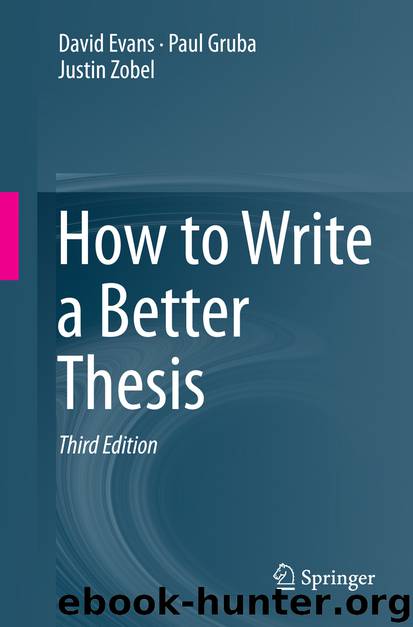How to Write a Better Thesis by David Evans† Paul Gruba & Justin Zobel

Author:David Evans†, Paul Gruba & Justin Zobel
Language: eng
Format: epub
Publisher: Springer International Publishing, Cham
Understanding Current Theory, Discoveries, and Debates
Examiners will be sensitive to instances in which major contributions are neglected, or their significance downplayed. Summarize their contributions completely and honestly. But remember also to point out how these other studies may have advanced the discipline. For example, one student of mine, Raymond, had a tendency to write about all previous papers as in one of two classes: a few papers were insightful, ground-breaking, and of critical importance; the rest were, in his view, more or less misguided, confused, foolish, or wrong. He often failed to see how they made useful contributions (perhaps in a context that was now outdated, which however does not mean that the work was invalid), possibly because of a lack of appreciation of the fact that much research is incremental. At times he almost seemed to want to be a giant-killer who was bringing down the inflated reputations of esteemed researchers. The net effect was that his criticisms could seem inconsiderate and harsh, that is, they lacked balance.
Throughout this second section of your review, keep in mind that you are engaging in a conversation with other academics. Engagement is the key concept: it is a spirit of ‘give and take’ that respects the value of multiple perspectives. It is easy to make the mistake of thinking that the function of this section is merely to ‘report’ or ‘describe’ previous studies in an effort to show that you have ‘done your homework’. Rather, you should interweave various studies to build up the argument that the problem you are tackling is not yet solved and still raises some interesting and unanswered questions.
Eventually, you will come to an understanding of the most recent thinking in the field. At that point, briefly summarize the main points that are still troublesome. You have identified the ‘gaps’ in the theoretical framework and areas that have remain relatively unexplored by previous researchers. This summary should be setting the ground for the questions or hypotheses that you will be identifying in your chapter on design of your own research. In a sense, these are the gaps that you are trying to fill with your own original contribution.
Download
This site does not store any files on its server. We only index and link to content provided by other sites. Please contact the content providers to delete copyright contents if any and email us, we'll remove relevant links or contents immediately.
| Administration | Assessment |
| Educational Psychology | Experimental Methods |
| History | Language Experience Approach |
| Philosophy & Social Aspects | Reform & Policy |
| Research |
The Art of Coaching Workbook by Elena Aguilar(51201)
Trainspotting by Irvine Welsh(21668)
Twilight of the Idols With the Antichrist and Ecce Homo by Friedrich Nietzsche(18635)
Fangirl by Rainbow Rowell(9254)
Periodization Training for Sports by Tudor Bompa(8274)
Change Your Questions, Change Your Life by Marilee Adams(7783)
This Is How You Lose Her by Junot Diaz(6889)
Asking the Right Questions: A Guide to Critical Thinking by M. Neil Browne & Stuart M. Keeley(5775)
Grit by Angela Duckworth(5615)
Red Sparrow by Jason Matthews(5476)
Paper Towns by Green John(5191)
Room 212 by Kate Stewart(5125)
Ken Follett - World without end by Ken Follett(4734)
Housekeeping by Marilynne Robinson(4449)
The Sports Rules Book by Human Kinetics(4388)
Papillon (English) by Henri Charrière(4274)
Double Down (Diary of a Wimpy Kid Book 11) by Jeff Kinney(4273)
The Motorcycle Diaries by Ernesto Che Guevara(4102)
Exercise Technique Manual for Resistance Training by National Strength & Conditioning Association(4072)
